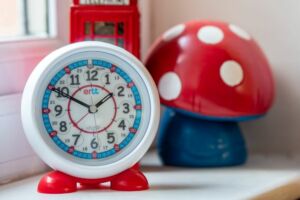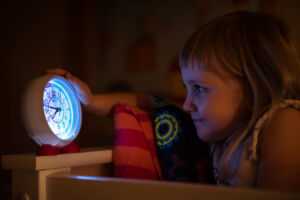Are bedside clocks a necessity for your child’s room, or are they just another gadget to clutter up their space? Join us as we explore the impact of introducing a clock to your child’s bedside table, and check out our EasyRead alarm clock range that has been specially designed to foster time-telling and time management skills without disrupting sleep.
Children’s bedside clocks
Introducing a bedside clock into your child’s nighttime routine might seem like a simple decision, and it is a great idea to give your child the tools to tell the time themselves as soon as they wake up. However, it can also seem obsolete in a society that has mobile phones within arm’s reach at all times, so if you’re still on the fence about investing in a bedside or alarm clock, let’s weigh up the pros and cons of these time-telling tools.
1. Time-telling
These clocks are fundamentally educational resources, and their usefulness comes from their clear and engaging design that supports children’s learning. Being able to tell time is a fundamental skill for all primary school aged children in the UK, and having an analogue clock readily available as soon as they wake up helps to facilitate this learning process.
This hands-on practice every morning helps children to take responsibility for their own learning, as they can check the time on their own without relying on their parents to tell them the time or even wake them up. This eventually develops into a deeper understanding of the concept of time and its passing, as they will also be able to see the amount of time that they have slept for on the clock or how much time they have to get ready for school, as they become more independent and familiar with the clock.
2. Time management skills
Once a child is able to wake up and immediately recognise a certain time on the clock, they will also be able to understand that times’ placement within the day – whether that is before their alarm goes off, as their alarm goes off, or after. This subtly shifts the beginning of the child’s day from whenever an adult comes to wake them, to a more fixed, tangible time that can be read on a clock.
Owning a clock therefore encourages children to become active participants in keeping track of their daily routines, such as knowing when to wake up, start getting ready, or prepare for bed, and even managing these important tasks in some cases. These regular interactions with a clock, and this early introduction to scheduling and maintaining a routine, not only prepares them for school but also lays the foundation for successful time management in their future.
3. Improved sleep
Unlike smartphones or tablets, which emit disruptive blue light, our silent glow in the dark bedside clock provides a way of checking the time at any point throughout the night without needing to look at a screen. Opting for analogue, silent bedside clocks continues to reduce the amount of screen time our children have and helps encourage better sleep habits.
This in turn helps to establish and maintain a natural sleep-wake cycle that does not rely on digital screens, which not only aids their mental and emotional wellbeing, but also helps maintain their daily energy levels and performance at school.
Potential drawbacks
When exploring the impact of these time telling tools on a child’s development and daily schedule, it’s important to consider the potential drawbacks of opting for the wrong clock. From the potential disruption to sleep patterns, to the risk of creating an anxious association with time-keeping, let’s explore why parents need to carefully choose the type of clock they opt for.
1. Sleep disruption
On the cons side, some might argue that introducing a clock into a child’s room can inadvertently lead to sleep disruptions. Bedside clocks with light features, such as glowing numbers or backlit displays, can affect a child’s natural sleep cycle, whilst the ticking sounds may be distracting and keep your child awake at night.
To make sure that every child has access to a clock without disrupting their sleep, we have designed our clocks to address these negative effects. Our EasyRead clocks come with an LED night light and a built-in sensor to control the brightness of the clock face and minimise light interference; or if your child prefers, this light can be turned off completely. Our silent glow in the dark bedside clock is also designed to operate silently, with a silent sweeping movement that eliminates the distracting ticking noise that is common in most other designs.
2. Sleep anxiety
It’s important to consider your child’s personality and sleep habits when deciding whether or not to give them a clock, as some children can become fixated with its display. Constant exposure to the time can lead to anxiety in sensitive children, particularly if they obsess over time during the night or worry about waking up on time. This can affect their ability to relax and fall asleep if they are worried about waking up late for school, or cause them anxiety if they are scared of the loud alarm that has replaced their parents’ voices in the morning.
The child-friendly features of our clocks are designed to reduce these anxieties, and we have replaced the usual alarm sounds with a gentle crescendo alarm, a glowing clock face, and a snooze option for a natural and gentle awakening. With this knowledge, children can fall asleep confident that they will be gradually woken up by a system that aligns with the body’s internal clock and won’t alarm them.
Similarly, if you find your child obsessing over the time or have noticed that they are becoming anxious about oversleeping, you can turn off the clocks’ internal night light and minimise the temptation to constantly check the time. This, combined with a clear demonstration of the clocks’ alarm system to set their mind at rest, reduces their focus on the passing hours and encourages a more restful night’s sleep, safe in the knowledge that they will be woken up when the time is right.
Children’s alarm clocks
Our clocks are thoughtfully designed to meet the needs of children and parents, and to address the common concerns around sleep quality and anxiety with adjustable brightness, quiet operation, and gentle alarms. Whatever the specific needs of your family, our clocks nurture a good sleeping environment that aligns with your child’s wellbeing and daily routines, so if you’re ready to take the next step in your child’s time-telling journey, explore our alarm clock range today.

